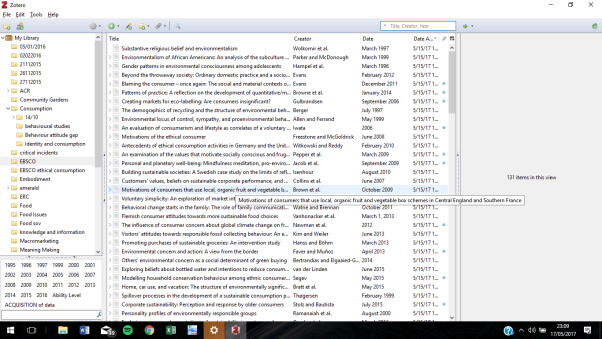Tackling the Literature Review
Andreea Bocioaga is in her second of year of doing a PhD in the Adam Smith Business School, looking at sustainable consumption in urban food growing. In this post, she shares her experiences and advice for writing a literature review.
Depending on your research programme, you might be expected to write a literature review as one of your thesis chapters. The literature review is about contextualising your PhD, engaging with the current academic debate in your field and setting the grounds for the value that you are adding through your own work.. The literature review can seem like a long and arduous process, but it can also be exciting too. Your literature review allows you to build credibility as a scholar, and show that you can hold your own in a conversation with other academics.
Here are some of my thoughts and tips based on my experiences, and talking to other PGRs.:
1.Have a strategy/guiding principle for your organising your sources I spent my first year reading and producing summaries of topics without a guiding principle when selecting what I was reading. I do not regret doing this as I was doing a lot of theoretical development, but that means I am now having to cluster all of of my (982) articles which is quite time consuming. There are plenty of ways to organise your sources; I chose to do so chronologically and by database, but you could also do so by author or journal title.
2.Use database advanced searches I cannot be thankful enough for the Emerald Insight Database Advanced Aearch parameters that lets you filter your searches. For example, if you want to see only empirical or conceptual papers or papers on very specific subjects.
A2
3. Get a reference manager This is the best life advice I can give to a Social Science PhD student. I personally use Zotero. It has an online version of all of my identified references with links and PDF of the articles when possible. Also, if you are on campus it automatically downloads the PDF without you having to login into each and every database, which is the main reason I use my office. I also have a desktop app on two devices, and a browser button that allows me to save each article/book/anything interesting into my reference manager immediately, with PDF file on each device.
4. Export those database search results into your reference manager Once you have filtered down your researcher to your desired parameters, you can export them into your computer and then import them into your reference manager. It saves you clicking on each and every one of them in order to save it.
5. Have a review matrix This is something that I wish I had much, much, much earlier. Last year, I knew the key authors and the work they had done, but it’s almost like they were in floating bubbles in my head, and I couldn’t construct a seamless narrative from one to the other which is a vital element of your literature review. In my second year I was struggling with the clutter of articles on my desk and in my head. I have started a matrix simply to declutter my head, and to better understand the way the research in my field has developed over the years and the key turning points in terms of the theories used over the years.
6. Look at review papers and how they approached their task They are incredibly useful for giving you suggestions on what to look for when reading an article on your specific topic, and how to question the quality of the work you are reading.
7. Write This is something I am still working on. In your first year you spend so much time reading, you get used to it. Also, sometimes imposter syndrome can make it harder to feel confident, start writing and begin to critically engage with other people’s work You just have to start doing it little by little. I personally like to organise my writing in chunks. For example, each chapter has around 25000 words and each subchapter around 8000 words which is further split into specific sections.
Always remember: you can do it!
Do you have any top tips or advice for PGRs taking on their literature review? Let us know in the comments, or tweet us @UofG_PGRblog- we'd love to hear from you!







